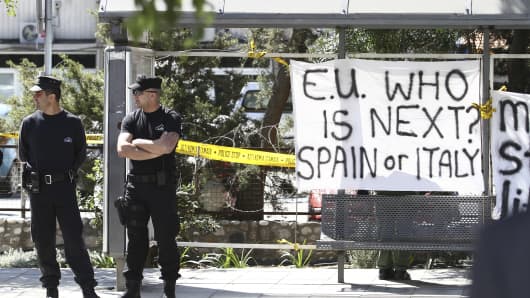The secretary, Joyti De-Laurey, was sentenced to seven years in prison in April 2004.
Here's how Andrew Ross Sorkin described the crimes:
Ms. De-Laurey, 35, accomplished her scheme by forging transfer authorizations for Mr. [E. Scott] Mead's private account at Goldman and faxing them to the bank's office in New York, taking as much as $3 million at a time from February 2001 to April 2002.
The scheme unraveled when Mr. Mead was preparing to make a donation to Harvard University in honor of his 25th class reunion and asked Ms. De-Laurey for a copy of a recent statement. When she did not produce it, Mr. Mead called the firm's New York office himself. When an account representative started ticking off wire transfers to the Bank of Cyprus during the phone call, Mr. Mead learned that he had been deceived.
As investigators connected Ms. De-Laurey to the missing funds, they discovered that she had also stolen almost $2 million from her a previous Goldman boss, Ron Beller, and his wife, Jennifer Moses, who also worked at the firm. Ms. De-Laurey claimed Mr. Beller had given her the money ''as a reward for me being me.''
Julie Bindel of the Guardian explained what she did with the money:
With the money, it was reported at the time of her trial, De-Laurey bought 11 properties in the U.K., a 750,000 seafront villa in Cyprus, luxury cars (including a downpayment on a $175,000 Aston Martin), more than $300,000 worth of Cartier jewelry, flying lessons for her husband, a 150,000 speedboat, a string of cars, clothes from Chanel and Louis Vuitton, and lavish holidays. On one occasion she treated herself and another secretary to $5,000 ringside seats at the Lewis/Tyson boxing match in Memphis, plus first-class air tickets. She also gave a lot of money away to friends and family, and made a $10,000 donation to a charity for sick children.
During the trial, De-Laurey had maintained her innocence. But afterwards she spoke openly about her crimes. She denied, however, that her husband and mother—who were also found guilty at trial—participated in the crimes.
At the time, a lot was made of the fact that it apparently took several months before the bankers realized their money was missing. Beller and Moses, it was said, never noticed until the police detected the theft. At least some people wondered whether stealing from people too rich to notice was really a crime at all.
De-Laurey never seemed very repentant about her crimes. Rather, she was sorry that her family got nabbed for them.
Bindel again:
Does she have regrets about what she did? "Yes," she says, "mainly because of Tony and my mummy being dragged into this, because they are totally innocent. And nothing in life is worth being in prison and being apart from your child."
On my last visit to De-Laurey, she admitted she deserved some punishment, but added, "They could afford to lose that money, and everyone knows I could never do this again. I am being punished because I dared to take from people like them. That's not the way it's meant to be."
So where are these folks today? As far as I can tell, none of them have anything to do with Cyprus.
Beller went on to team up with another former Goldman banker Geoff Grant to found a hedge fund called Peloton Partners in 2005. In 2007, Peloton won the Eurohedge New Fund of the Year award after seeing a return of 87 percent in 2007 by shorting subprime securities. But in 2008, Peloton ran into trouble and spectacularly blew up. It was short subprime, but long Alt-A mortgages, a strategy that got crushed as the mortgage meltdown spread into what many saw as safer mortgages.
Beller then founded Branch Hill Capital with Manal Meta. The fund is usually described as following a "deep-value special-situations strategy," but it is best known for its criticism of Bank of America, which it argued was under-reserved the costs mortgage repurchases. Grant set up another hedge fund also, called Grant Capital Partners, but that fell apart last October.
Scott Mead, the Goldman banker who detected De-Laurey's thefts, went on to found Richmond Park Partners, a boutique investment bank based in London. RPP recently merged with the London business of Compass Advisors, a U.S. merchant banking group. Mead has also become a fine art photographer.
The last time De-Laurey was heard from, she was still being chased by Goldman's insurers to recover assets from her crimes.



